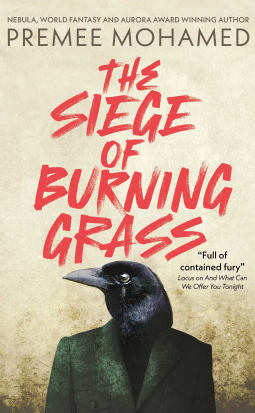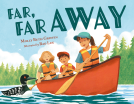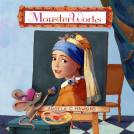
The Siege of Burning Grass
by Premee Mohamed
This title was previously available on NetGalley and is now archived.
Send NetGalley books directly to your Kindle or Kindle app
1
To read on a Kindle or Kindle app, please add kindle@netgalley.com as an approved email address to receive files in your Amazon account. Click here for step-by-step instructions.
2
Also find your Kindle email address within your Amazon account, and enter it here.
Pub Date Mar 12 2024 | Archive Date Mar 05 2024
Rebellion | Solaris
Talking about this book? Use #TheSiegeofBurningGrass #NetGalley. More hashtag tips!
Description
The Empires of Varkal and Med’ariz have always been at war.
Alefret, the founder of Varkal’s pacifist resistance, was bombed and maimed by his own government, locked up in a secret prison and tortured by a ‘visionary’ scientist. But now they’re offering him a chance of freedom.
Ordered to infiltrate one of Med’ariz’s flying cities, obeying the bloodthirsty zealot Qhudur, he must find fellow anti-war activists in the enemy’s population and provoke them into an uprising against their rulers.
He should refuse to serve the warmongers, but what if he could end this pointless war once and for all? Is that worth compromising his own morals and the principles of his fellow resistance members?
Available Editions
| EDITION | Other Format |
| ISBN | 9781837860463 |
| PRICE | CA$36.99 (CAD) |
| PAGES | 432 |
Available on NetGalley
Featured Reviews
Just incredibly good- not only as a story and something with world holding unlike anything I’ve seen before, but also as a meditation on war and resistance that does not sacrifice character at the altar of allegory. Especially pertinent right now- I absolutely loved this book, heartbreaking as it was, and highly recommend it.
 Sarah B, Reviewer
Sarah B, Reviewer
I found this book fascinating. I'm partial to smart, un-beautiful, conflicted protagonists like Alefret. He's was born a malformed giant, and more recently has an amputated leg that is growing back, thanks to being experimented on by a mad scientist while imprisoned. He's also gentle, thoughtful, and immensely principled. A pacifist so committed that he has written the manifesto for how to be one, he is throughout the book thrown together with a violent zealot who he utterly hates, and yet resists killing or even harming. The book is an examination of how to be a pacifist when given every opportunity to kill someone you know is going to kill or otherwise cause the death a great number of others, someone you would take pleasure in killing. The unusual, highly original world this is set in makes this a fascinating story. Alefret's people have advanced bioengineering, so there are living tools of all kinds, such as wasps that deliver various drugs, spiders that make bandages, and lizards that create bullets. The enemies have a flying city. The writing is excellent, the characters superbly developed, the story completely unique, and the ending entirely satisfying. I highly, highly recommend this book!
 Charles G, Reviewer
Charles G, Reviewer
Very powerful look at war (even in a fictional/fantastic/SF setting) and what some people will do to stand against it. Well developed cultures and characters, ending seemed to come a bit quicker than the rest of the book. The main character is unlike most protagonists you see in SF.
 Hannah K, Reviewer
Hannah K, Reviewer
Thanks again to Solaris for passing this along! This is a hell of a novella that I devoured in the space of Christmas Eve and Day this year, accompanied for a not insiginificant portion of time by a glass of wine and some cheese and sausage. The core of the novel would already be a hell of a setup - the leader of a pacifist movement being tortured by his own governement and sent as a spy to the enemy, but who is also on his own mission (which I think you can probably guess giving Mohamed's previous books, but I'll not spoil it for you). The message of community and care at the heart of this while also balancing survival in a greater hostile environment is great, and you're going to want to pick this up when it comes out, trust me and just preorder it now.
 Reviewer 412183
Reviewer 412183
In the face of the unrelenting death and misery of war, what recourse do everyday people have to try to stop it? If we believe war and violence are abhorrent, would it be better to lose the war than prolong it? Is specific, targeted violence okay if it appears likely to forstall more violence?
The Siege of Burning Grass by Premee Mohamed tackles these questions and more. Set in a war-torn corner of a nameless world, famous pacifist leader Alefret languishes in a prison of his own nation, a nameless scientist experimenting on him to see if his blown-off leg can regrow, using biologically altered wasps to sting the medicine into him. Alefret is used to suffering, having been born with a genetic condition that makes him enormous, with an obviously distinct face and hunchback; he refuses to reveal anything about his fellow members of the pacifist movement called the Pact. But soon a general coerces him into action with a very specific plan: if he and a fierce diehard soldier named Qhudur can sneak their way into the enemy’s floating city, he can ally with the enemy nation’s own pacifist movement, and using their trust, allow Qhudur to sneak in and kill the nation’s leaders. It is an act of deceit and broken trust, but if it works, it would mean the end of the war and the end of all this killing.
Alefret and Qhudur hate each other, but must rely on each other to succeed in their harrowing journey. They spend much of the book clashing ideologically as they make their way across the desolate grasslands between their city and the floating city of their enemy; Alefret denouncing the war as pointless and evil while Qhudur critiques his presumed naivety and cowardice. It’s here in these war-torn fields, living off the land and grappling with difficult questions, where the book is the strongest, evoking other resonant anti-war narratives outside of the world of speculative fiction. Mohamed strikes a difficult balance many lesser writers fail to achieve; she asks difficult moral questions without clear answers, yet never lets us believe that Qhudur’s nihilist and infantile violent worldview is anything but abhorrent.
The secondary fantasy world of the novel is only ever sketched in around the edges of Alefret’s vision, but it’s a fascinating one. Technology appears to be roughly around the war years of the early 20th century, with guns, radios, and planes; yet there are other stranger devices. Alefret’s nation utilizes creatures, perhaps biomedically altered or perhaps native, as technology, from the aforementioned vaccine-hornets to the pteridons that serve as flying vehicles or the lizards that produce bullets.
The Siege of Burning Grass deserves to stand among other great SFF fiction about war; unlike many other books that are granted this comparison, it actually evokes Ursula K. Le Guin, with a magical world filled with wonder and yet burdened by the same horrors as our own, a story told beautifully, and ideas that counter much of the simplistic good vs. evil schemas of classic fantasy. Unfortunately, I found that the book’s rather muddled and sudden ending undercut some of its themes, which wasn’t enough to ruin the book at all but maybe keeps it from true masterpiece status. Regardless, this is a really special novel, once with a profound empathy and righteous anger, that feels especially relevant in our current era.
Thanks to NetGalley for the advance copy in exchange for an honest review. All thoughts expressed are my own.
 Lisa D, Reviewer
Lisa D, Reviewer
Alefret is a pacifist who doesn't want to compromise his morals and beliefs. He's living through a time of war where it seems that the nations are going to kill until there is no one left. He has a chance to do something to help -- maybe -- and goes on a mission with a murderous soldier to try to put an end to the war.
This world was dark but I'm going to miss it. Rarely do I read something that draws me in so completely.
This is another world with different technology, and it feels both old-fashioned and modern in different ways. There were so many different groups and languages, too.
Thanks to NetGalley for letting me read this
Readers who liked this book also liked:
Nigel Henbest; Simon Brew; Sarah Tomley; Ken Okona-Mensah; Tom Parfitt; Trevor Davies; Chas Newkey-Burden
Entertainment & Pop Culture, Humor & Satire, Nonfiction (Adult)
Sara T. Behrman
Children's Fiction, Outdoors & Nature, Parenting & Families


















